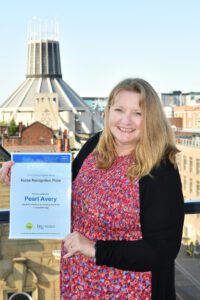Pearl Avery
How to manage the care of inflammatory bowel disease patients differently, sharing expertise from secondary care to primary care.
Nurse Recognition Award Winner:
“An Advanced Nurse Practitioner with a Special Interest in GI Evaluation of Patient Benefit.”

Throughout her career in secondary care, Ms Avery expresses how many patients have been referred who didn’t need to be and also how many patients have unnecessarily been on circular journeys between primary and secondary care. Unfortunately, a lot of the time, this led to no resolutions of symptoms, she comments. Ms Avery wanted to change this in patients with inflammatory bowel disease and how sharing expertise from secondary care with primary care may help to support this.
Ms Avery describes how GPs generally do not have the knowledge or confidence to make decisions on diagnosis and/or treatments within inflammatory bowel disease. However, there is also emphasis on ‘red flag’ GI symptoms that ultimately can lead to GPs referring to secondary care regardless, to err on the side of caution.
Starting from a local GP practice post pandemic, Ms Avery offered her services with their support and it soon became apparent how she could fit into their working systems.
She explains:
“Initially I was given patients with general presentations, some with histories and some who were new, although this later evolved into all GI related issues and symptoms. For GI related and complex presentations, I had a half hour slot, allowing me to take a thorough history including all tests and treatments.
Having specialist GI skills and experience of secondary care enabled me to either diagnose and treat patients there and then, to order relevant tests or, if necessary, make the best quality referrals.
Over a six-month period, out of the 65 GI patients I saw, 58 were given or had a firm diagnosis which resulted in treatment or referral. The most common diagnosis was of constipation and haemorrhoids (n=11) respectively.
These patients were examined, received treatment and bleeding was resolved in all cases. Eight patients had infections, including two with worms who were also treated successfully. Two
cases of intractable diarrhoea had received a diagnosis of microscopic colitis 18 months previously but were not being treated.They were started on budesonide and the symptoms resolved with a resultant huge improvement in their quality of life. Three ulcerative colitis patients had their mesalazine treatment optimised, avoiding the need to contact IBD services. One patient with a history of anal cancer was referred on.”
Currently, Ms Avery carries out a full day with 27 slots altogether, including triage of any patient calls with a bowel issue. She also orders tests before seeing patients in clinic which saves time and leads to more accurate diagnosis.
Why did you choose this project?
Ms Avery commented on her experience of her project:

“I believe that this project has provided real benefit to patients and the GP practice, and I am passionate about taking this out to GP networks to see if this model may be adopted by other practices. This award has provided me with the funding to support this idea, giving me capacity to work on the analysis which will allow me to clearly demonstrate the cost benefit and how the model can fit into primary care.
The next stage is to carry out a proper cost benefit analysis of this project along with a patient survey. From this, I hope to offer this service out to other local GP networks, either with me or potentially other specialist IBD nurses.
This has been an extremely fulfilling project. It has been lovely to get patient feedback on how simple measures such as rapid diagnosis and effective treatment at a primary care level can really change lives.’
On a personal level, I am extremely proud of this work. It has been really good to receive the validation that winning such an award brings. I would also like to thank Wyke Regis & Lanehouse Medical Practice who were willing to support this novel role.
- Pearl Avery



